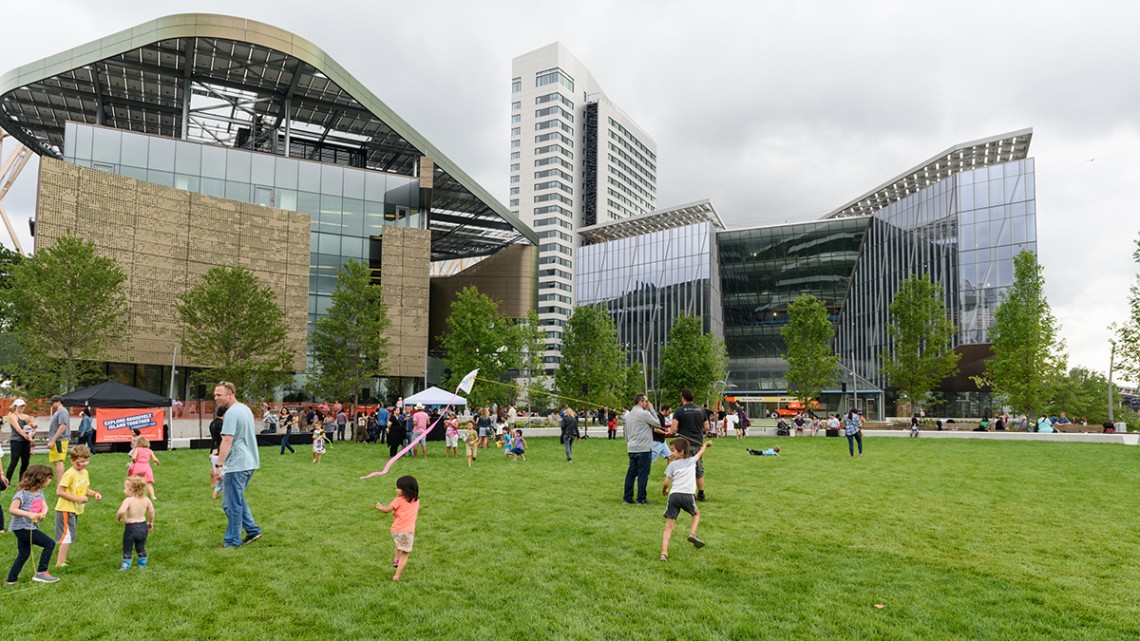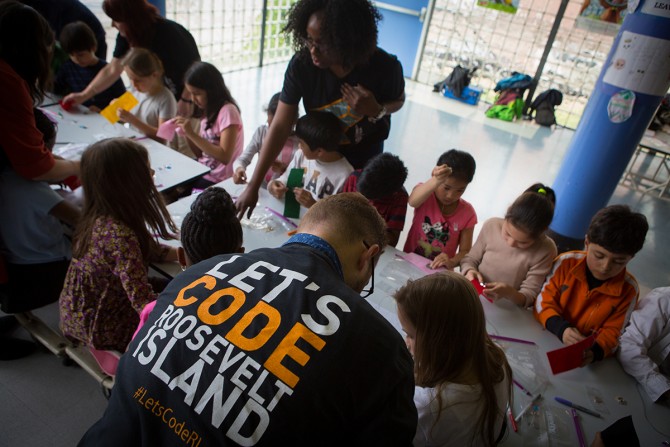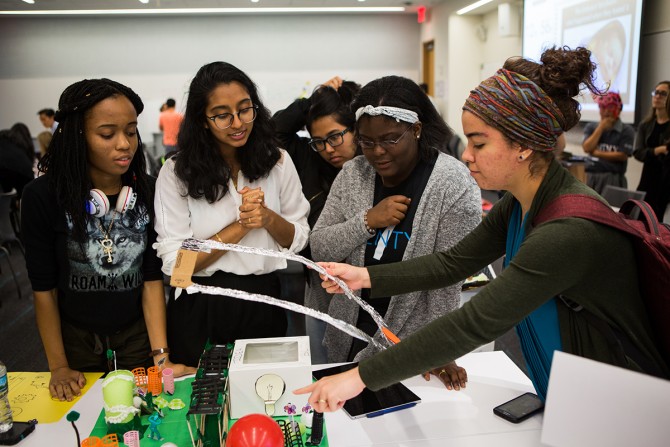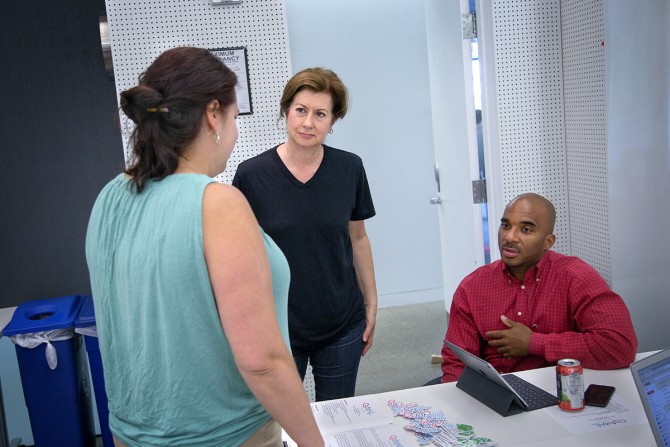
Roosevelt Island and Cornell Tech families enjoy Community Day, Aug. 5, 2017.
Cornell Tech fosters community connection and collaboration
By Nancy Doolittle
“Tech driven,” “outward facing” and “community oriented.” These Cornell Tech hallmarks define the relationships Cornell Tech has developed with Roosevelt Island residents, the City University of New York (CUNY), and local schools in New York City and Ithaca in advance of the dedication of the Roosevelt Island campus Sept. 13.
“Though home to about 14,000 – a mix of families, young professionals and retirees – Roosevelt Island is small, about 2 miles long and 800 feet wide,” said Jane Swanson, Cornell Tech’s assistant director of government and community relations. “From the beginning, we wanted to reassure residents that Cornell Tech would be a good fit with the island community.”
Swanson arranged for office space in an art gallery on the island, where residents could learn about Cornell Tech’s construction plans and programs, and established town hall meetings and a community and construction task force to address concerns and provide updates. Recently, Roosevelt Islanders and Cornell Tech staff, faculty and students joined together in a community day celebration.
“Roosevelt Islanders are supportive of Cornell Tech and are very enthusiastic about our new campus. They want to be sure the community’s perspective is taken into account and so do we,” Swanson said.
Diane Levitt, senior director of K-12 education for Cornell Tech, said Cornell Tech is “deeply involved” in schools on Roosevelt Island and other New York City communities. “We are working with more than a dozen New York City schools, including public schools P.S./I.S. 217 on Roosevelt Island and Hunter's Point Community Middle School in Queens, to prepare students to participate fully in the digital world that awaits them. We’ve already impacted more than 5,000 students and 350 teachers,” she said.
Cornell Tech’s K-12 education work also furthers the city’s 10-year initiative, Computer Science for All (CSforAll), to involve every student in New York City in computer science. Some of the ways Cornell Tech partners with public and private schools:
- Cornell Tech’s Teacher-in-Residence program works with teachers who are often new to computer science education, providing professional development in computer science content, curriculum and teaching strategies. Nearly 40 teachers across six schools have already benefited from this program, Levitt said.
- Cornell Tech faculty and staff work with elementary and secondary education teachers on K-12 curriculum development to integrate computer science thinking into other subject areas.
- More than 50 percent of Cornell Tech students volunteer their time and knowledge as mentors and tutors to students in New York City public schools and at such events as hackathons, makeathons and coding competitions.
- Cornell Tech’s annual “To Code and Beyond” conference brings together educators, nonprofits, policymakers and New York City education funders to explore various topics in K-12 computing education.
Strengthening the Ithaca-Cornell Tech connection, Levitt and colleagues from the CSforAll Consortium recently presented a school district computer science education planning process to 36 educators from eight local school districts in and around Ithaca, New York, and from Tompkins-Seneca-Tioga BOCES. Area superintendents hope to visit Cornell Tech and attend “To Code and Beyond” this fall.
Cornell Tech also is working with CUNY to increase the pipeline of college female students who may be interested in pursuing a career in technology, to help counter the 30-year decline in the percentage of women entering computer sciences.
“Part of the Cornell Tech mission is to develop digital technology leaders for the future,” said Judith Spitz, Cornell Tech’s program director for the Women in Technology and Entrepreneurship in New York (WiTNY) Initiative – a partnership between CUNY and Cornell Tech funded by a growing group of corporate partners. “Studies show that better technological solutions come from having diversity within the teams solving the problem, so we are constantly asking, ‘Are we training a diverse set of leaders?’ ‘Are we providing access to all the communities out there, including women?’”
WiTNY was created to help increase that access for women in undergraduate and graduate programs by providing curriculum innovation, career access through internships, financial support through scholarships and fellowships, and space for collaboration, community development and professional networking.
For high school students entering CUNY, WiTNY offers an intensive two-week summer program that immerses them in the entire digital product development life cycle and connects them with community members, software developers and corporate volunteers. In 2016, the program served 42 female students; in 2017, the number rose to 200.
“CUNY has more than 250,000 undergrads – from diverse ethnicities and socio-economic backgrounds – spread across its 24 campuses in New York City,” Spitz said. “Through our partnership with CUNY, Cornell Tech can scale up its community impact.”
The benefits of Cornell Tech-community collaborations go both ways: Many of Cornell Tech’s graduate student projects have been informed by the needs of New Yorkers in general. These include technology solutions to challenges faced by people with disabilities and older adults, an analysis of automobile traffic congestion, and applications for speech therapy and domestic violence survivors.
Cornell Tech also collaborates with colleges and programs at Cornell on projects related to older adults and people with disabilities. These include the College of Architecture, Art and Planning; the College of Human Ecology’s Bronfenbrenner Center for Translational Research; the School of Industrial and Labor Relation’s Yang Tan Institute on Employment and Disability; Weill Cornell Medicine; Cornell University Cooperative Extension-New York City; and Entrepreneurship at Cornell.
By providing myriad opportunities for local, educational and corporate collaborations with a wide range of Cornell programs and colleges, Spitz says the new campus “will provide an incredible opportunity to open the doors to participatory innovation and create a sense of inclusiveness in the tech community that has already begun” through WiTNY, K-12 initiatives and other community-oriented Cornell Tech programs.
Media Contact
Get Cornell news delivered right to your inbox.
Subscribe

